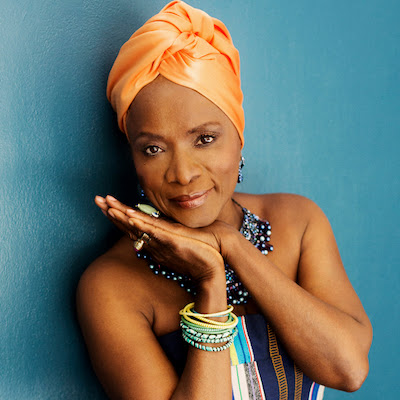
Music, the Diaspora, and the World
Click Here to Watch the Livestream (on Zoom).
This event is both in-person at the Social Science Matrix (820 Social Sciences Building) and online. Please register to attend, whether in-person or remotely.
One could say that, by definition, music is the most diasporic of art forms. It is movement itself. It is hybridity. It passes from place to place and from time to time, heedless of natural or social borders. Music belongs everywhere, and yet it is always from somewhere. Diasporic themes and histories have been central not only to the creation and commodification of new musical forms, but also to the emergence of global identities and solidarities.
French-Beninese singer and composer Angélique Kidjo is the 2021-22 Cal Performances artist-in-residence. She talks with UC Berkeley scholars about the global circulation of African musical forms and musicians, their worldwide significance, and their social power. How are we to think about notions of "traditional music," "ethnic music," or "folk music" at the current time? Where and how does musical innovation take place, and how is it recognized and received in different parts of the world? How do we think about the entanglement between music and the struggle for social justice?
Participants:
Angélique Kidjo has been recognized by the BBC as “one of the greatest artists in international music today.” A genre- and border-crossing artist and four-time Grammy Award winner, she has been honored for her activism by the World Economic Forum and Amnesty International. Her work draws connections between contemporary issues and African musical traditions, and probes the past for lessons on improving the future.
Victoria Netanus Grubbs (African American Studies) is a postdoctoral scholar with the Black Studies Collaboratory. Her research addresses transnational/diasporic cultural networks, the semiotics of sound, and the aesthetics of blackness.
Ivy Mills (History of Art) is a scholar of African cultural studies who teaches courses on African and African diaspora visual cultures. She co-curated Love across the Global South: Popular Cinema Cultures of India and Senegal at the Bernice L. Brown Gallery.
Tianna Paschel (Sociology and African American Studies) is the author of Becoming Black Political Subjects: Movements and Ethno-Racial Rights in Colombia and Brazil and co-editor of Afro-Latin@s in Movement.
Cosponsored by Cal Performances, Social Science Matrix, and the Black Studies Collaboratory.
Click Here to Watch the Livestream (on Zoom).